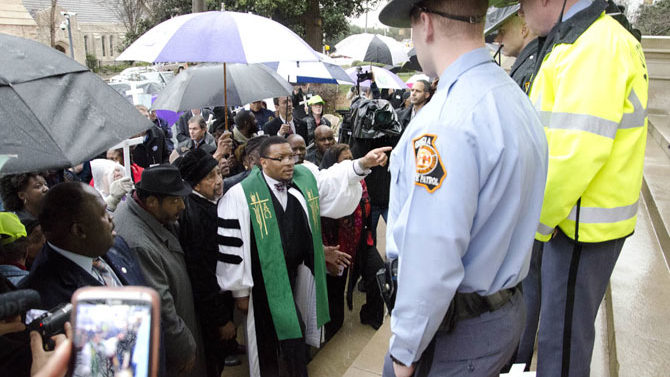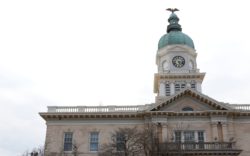On Monday afternoons, hundreds of Georgians have stood on the capitol steps to advocate for the expansion of the federal Medicaid health care program in Georgia. Many came clad in clergy attire, and the protests have been covered by national media.
Reminiscent of the first Moral Monday movement in North Carolina, the group aims to address the moral issues involved in current state policies. In North Carolina, the Rev. William Barber II of the NAACP and others were arrested on numerous occasions while protesting at the capitol. The movement quickly grew and diversified to include teachers, preachers and scientists of many racial and income groups. Thousands attended and hundreds were arrested.
In Georgia, advocacy groups customarily stand outside the capitol, visit the audience sections of both chambers and chat with legislators while waiting to have their pictures taken with the governor. On any given legislative day, Gov. Deal can frequently be seen quickly standing amidst visitors for photo-ops.
Knowing that Deal’s office is where the buck stops on Medicaid expansion, protesters planned to visit his office in order to discuss the issue with him. Approximately 10 Moral Monday leaders staged a sit-in Jan. 27. Deal refused to even meet with them, let alone have his picture taken.
The “Medicaid 10” were arrested at 5 p.m., the close of the business day. They were charged with obstruction and criminal trespass (both misdemeanors) and released on signature bonds the following morning.
Barbara Joye, spokesperson for Georgia’s Moral Mondays group, wrote the following about the group’s efforts to meet with Deal: “I checked with a member of our steering committee and was able to confirm that to this date, the governor has not met with anyone from our coalition to formally address the issues we are raising. In fact, his refusal to meet with our delegation that visited his office on the 27th to discuss Medicaid expansion, though he was in the state capitol, was the reason for our sit-in there.”
Part of the Affordable Care Act, the expansion of Medicaid was devised to address a coverage gap for those Americans too poor to qualify for the health care exchanges but currently not able to qualify for Medicaid. Medicaid expansion would cover working Georgians who make up to $15,856 per year. This amounts to more than 600,000, or about 7 percent, of Georgians.
Deal has refused to accept federal money to expand Medicaid while criticizing the Affordable Care Act. Citing estimates that expansion would cost the state $4.5 billion over the next 10 years, he said the state could not afford to expand the program. Tim Sweeney, a health care expert with the Georgia Budget and Policy Institute, disagrees with that figure. He calculates the state’s portion to be around $2.1 billion, or 1 percent of the state’s budget, over the next 10 years.
Medicaid expansion and indigent care funds for hospitals were included in the ACA in order to help keep struggling hospitals afloat in light of the financial drain uninsured patients have on hospitals. Given the U.S. Supreme Court ruling allowing states to opt out of expanding Medicaid expansion, many hospitals are predicted to close. The Georgia Hospital Association and others have publicly requested that Deal reconsider in light of recent state revenue increases.
Georgia’s main trauma and safety net hospital, Grady Memorial, is facing cuts over $25 million this year. The state already provides over $90 million per year to the ailing hospital. In light of the fact that Medicaid expansion could bring much needed dollars, many have questioned the Deal’s decision to provide more funds, in lieu of expanding Medicaid.
Harry Heiman, a physician and director of health policy at Morehouse College, says Medicaid expansion is “a no-brainer” in light of estimates that expansion could provide almost $14 billion in economic stimulus. “We are talking about expanding workforce capability by increasing health equity,” he says. “It makes both moral and financial sense.”
One of Moral Monday’s approximately 40 organizational leaders, Tim Franzen, representing Georgia’s Friends Service Committee (a Quaker organization) told GA Voice: “It’s the ultimate insult to hardworking people, to struggling folks who are working their butts off at a fast food joint or Walmart, and here’s an opportunity where they can get free healthcare. We’re talking about real lives here, real beating hearts that are going to die because of ideological stubbornness. We find it unacceptable, both morally and fiscally.”
Like what you just read? Support Flagpole by making a donation today. Every dollar you give helps fund our ongoing mission to provide Athens with quality, independent journalism.










